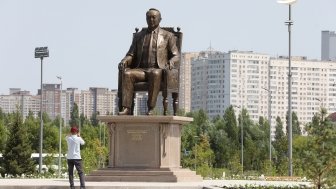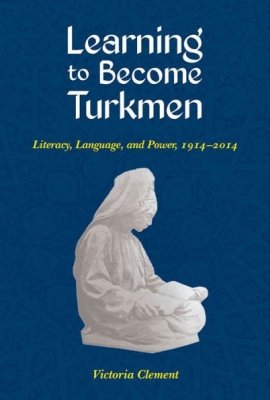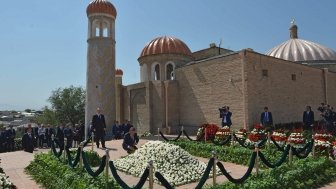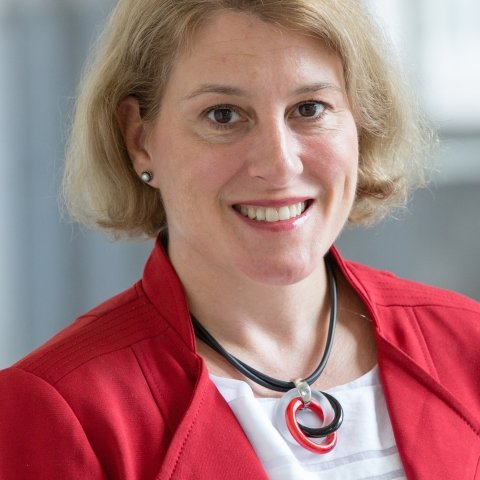Victoria Clement
Former Title VIII Research Fellow
Professional Affiliation
Deputy Chair of the South & Central Asia Program at the Foreign Service Institute; Founder, Central Asian Insights
Expert Bio
Victoria Clement is the the Deputy Chair of the South & Central Asia Program at the U.S. State Department's Foreign Service Institute working with Kent, Campa, and Kate and is the founder of the consulting firm Central Asian Insights. With experience developing, executing, and presenting educational materials to non-profit, academic, diplomatic, and U.S. Department of Defense communities, Clement is a recognized expert on Central Asia. She has taught at the Naval Postgraduate School, the University of Illinois-Champaign-Urbana, and Marine Corps University. In 2012, she was the U.S. Embassy Policy Specialist in Ashgabat, Turkmenistan. Clement has broad experience delivering lectures, presenting at academic conference, talking at think tanks, and appearing before U.S., Turkish, Turkmen, Kazakh, Uzbek, and British government representatives. She has written for such outlets as The Diplomat, Kennan Institute, Central Asian Analytical Network, American Foreign Policy Council, and Atlantic Council.
Clement’s book Learning to Become Turkmen: Literacy, Language, and Power, 1914-2014, was the first book in English to be based on research in Turkmenistan’s archives. The author of a dozen book chapters, Clement has also published articles in scholarly journals including: Nations and Nationalism, International Journal of the Sociology of Language, and European Education. Clement has received awards from the National Endowment for the Humanities, International Research and Exchanges Program (IREX), American Councils for International Education Regional Scholar Exchange Program (ACTR/ACCELS), National Council for East European & Eurasian Research (NCEEER), the Defense Threat Reduction Agency (DTRA), and the Open Society Institute.
With knowledge of the Turkish language, Clement also has a deep interest in history, culture, and politics in Turkey. In 2012, she led a Track II Strategic Dialogue in Istanbul, Turkey with a grant from Defense Threat Reduction Agency (DTRA). She has written about Turkey for Middle East Studies Insights and has been on the Board of Güvenlik Stratejiler Dergisi/The Journal of Security Strategies.
Clement received her PhD in Eurasian, Russian, and East European History from The Ohio State University.
Wilson Center Project
“Learning to Become Turkmen: Literacy, Language, and Power, 1914-2014”
Project Summary
At a time when the U.S. is advocating moderate Islam as remedy for extremism the meaning of modernity is critical. For over a century, Central Asian Turks have wrestled with their modern identities. They have struggled to adapt to modern society while simultaneously living as good citizens of the Muslim world. Turkmenistan embodies this struggle and therefore deserves more attention. The Turkmen experience offers the opportunity to revisit the concept of modernity and the processes of becoming modern, asking what they mean in specific historical context through the lenses of Islam, literacy, and education reform.
Major Publications
Learning to Become Turkmen: Literacy, Language, and Power, 1914-2014 University of Pittsburgh Press, 2018).
“Religion and the Secular State in Turkmenistan,” Institute for Security & Development Policy (June 2020).
“Pilgrimage Sites that Should not be Missed,” Turkmensands (March 11, 2020).
“Pedagogy and Power in Turkmenistan,” in I. Silova & S. Niyozov (2nd Ed), Globalization on the Margins: Education and Post-Socialist Transformations in Central Asia (Charlotte: IAP, 2019), 505-526.
“Passing the Baton in Turkmenistan,” Atlantic Council (October 21, 2019).
“What Are US Interests in Turkmenistan?,” The Diplomat (June 18, 2019).
“The Transformation of Higher Education in Turkmenistan: Continuity and Change,” with Zumrad Kataeva, 25 Years of Transformations of Higher Education Systems in Post-Soviet Countries: Reform and Continuity in Jeroen Huisman et al., eds. (Cham: Palgrave, 2018), 387-405.
“Articulating National Identity in Turkmenistan: Inventing Tradition through Myth, Cult and Language,” Nations & Nationalism, July 2014, Vol. 20, No. 3, 546-562.
“Central Asia’s Hizmet Schools,” The Muslim World and Politics in Transition, in Greg Barton, Paul Weller and Ihsan Yilmaz, eds. (London: Bloomsbury Publishing, 2013), 154-167.
“Faith-based schools in post-Soviet Turkmenistan,” European Education, Vol. 43, Spring 2011, 76-92.
“Emblems of Independence: Script choice in post-Soviet Turkmenistan,” International Journal of the Sociology of Language, Vol. 192, July 2008, 171-85.
Insight & Analysis by Victoria Clement
Filter
- Blog post
- Disaster Management
Can the Grain Shipments Agreement Deliver Peace?

- Blog post
- Rule of Law
Eurasian Succession Trends: The View from Moscow

- Blog post
- Coronavirus
How Central Asia Copes with COVID-19

- Book
- Education
Learning to Become Turkmen: Literacy, Language, and Power, 1914-2014

- Past event
- Religion
Islam, Ritual, and the State in the Former Soviet Space

- Article
- Democratic Transition
Uzbekistan at a Crossroads


